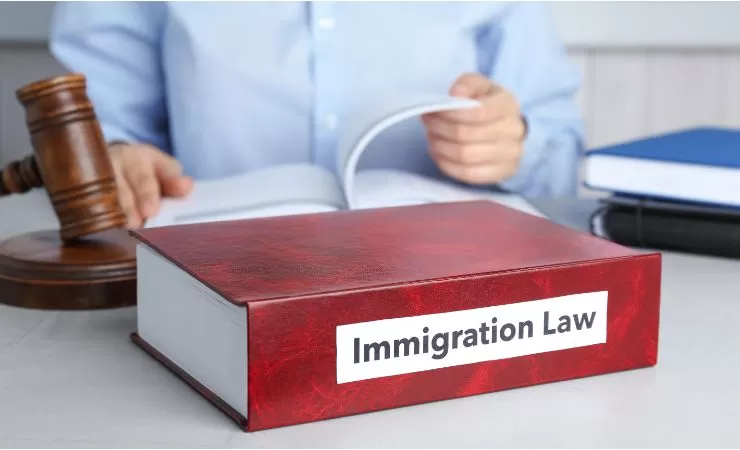Immigration is tricky, and many people are confused about the specifics. There are many classifications for people in the United States, like green card or visa holders. There’s no singular path to citizenship in this country, which makes the process vexing to those going through it for the first time. Specifically, many individuals get confused about what a naturalized vs. derived U.S. citizen is.
One of the most significant trip-ups for people is understanding the difference between a naturalized and a derived citizen. An immigration attorney can help you understand the difference between these two classifications and walk you through the basics of applying for either.
What Is a Naturalized U.S. Citizen?
First, it is important to examine the specifics of a naturalized U.S. citizen. Anyone falling under this category was not born in the United States or to parents with American citizenship. Instead, they are people from other countries who immigrated to the country and obtained citizenship.
The typical naturalized citizen is a first-generation immigrant, though that isn’t always true. Some naturalized citizens are second-generation immigrants whose parents never obtained citizenship while living in the country.
To qualify to become a naturalized citizen, you must fulfill a set of eligibility requirements from the government. These requirements are:
- Lived in the United States for at least five years in a row
- Not have left the country for more than a year
- No felony charges
- Older than 18
- Lived in the state you are applying in for at least three months
- Amenable to swearing the Oath of Allegiance
Any individual who fulfills those requirements may apply for naturalized status.
Naturalized citizens share all the same rights that natural-born U.S. citizens have. You can vote in elections and will not be susceptible to deportation to your country of origin.
Naturalization Trends in California
As a general rule, California continues to lead when it comes to immigration and naturalization in the nation. In the fiscal year of 2024 alone, there were 150,200 naturalization applications that were approved in the state of California, which is the greatest number in the United States.
Interestingly enough, 70% of all new citizens across the country were living in just 10 states, with over half of them concentrated in the top four, which are California, Florida, New York, and Texas. This shows just how crucial it is for effective immigration legal services to be offered in California, especially for people who are having difficulties when it comes to naturalization or derived citizenship.
With the demand being so high, it is more crucial now than ever to have experienced and compassionate legal support.
How Do I Apply to Become a Naturalized U.S. Citizen?
Before deciding to apply for naturalization, check if you meet the requirements to submit a naturalization application. If you do, you can begin the process. Be warned, the application process is full of bureaucracy and will take time for everything to finish.
You will need to gather any documents you have and then file a Form N-400. You can file this form online and pay the filing fee in the convenience of your house. You can also check how your application is doing on the U.S. Citizenship and Immigration Services website at any time.
The USCIS will ask you to make an appointment for biometrics testing. These tests ascertain that you are who you say you are. The organization will also ask you for any additional information or documents that they may need. Once you’ve completed biometrics testing, it’s time for the interview and the citizenship test.
After the interview, you just have to wait for the news if the government approves your application. If approved, you will participate in the naturalization ceremony and take the Oath of Allegiance.
Derived Citizenship: The Basics
Derived citizenship is slightly different from being a naturalized U.S. citizen. Simply put, a derived citizen is someone whose parents are naturalized citizens and who seeks to become naturalized themselves. The two share similar eligibility requirements, but derived citizenship comes with a few extra procedures for interested parties to go through.
In addition to the requirements for becoming a naturalized citizen, you also must have one of your parents be a citizen and have a permanent residence status. Your parents can either be birth parents or adopted parents. If you fulfill these requirements, you can submit a form for derived citizenship.
How Do I Get Derived Citizenship?
Derived citizenship does not require the same application process that naturalized citizens go through. Instead, you just need to fill out some forms to prove that you qualify for derived citizenship and wait for the process to finish.
The first step is to sign up on the USCIS website and create an account. You will have to provide the government with several documents to verify your identity and fill out Form N-600 to begin the process.
After filling out the form, you will just have to wait. The USCIS may ask you to provide original documents or submit to a biometrics test. Once the government is satisfied with all the documents that you have provided, they will inform you by mail that you have derived citizenship status.
U.S. Law Center – Immigration Attorneys You Can Count On
The dedicated immigration team at U.S. Law Center has a deep understanding of the challenges that immigrants face, especially those who have to deal with derived citizenship, green card applications, deportation defense, or naturalization. Led by Attorney Sanjay Sobti, we have decades of combined experience successfully defending the rights of individuals in California and providing efficient, compassionate legal support.
Based in Southern California, we serve clients across the region and have a demonstrated track record of successful outcomes, including counties that are densely populated, like Orange County, Riverside County, and Los Angeles County. If you are considering pursuing U.S. citizenship and are unsure about your eligibility, we can thoroughly review your case and help you understand your options.
Our firm’s founder, Sanjay Gupta, is a member of the American Immigration Lawyers Association (AILA) and multilingual, allowing us to connect with clients from all over the globe. We are eager to provide you with skilled legal counsel regarding naturalized versus derived citizenship in your language of choice.
Why Legal Help Makes the Difference
As the immigration process can be emotionally taxing and time-consuming, if you don’t have adequate requirements, you could risk misunderstandings, rejections, or delays that could potentially jeopardize your future in the United States. Therefore, it’s crucial to work with a seasoned immigration attorney. Specifically, they can help you with the following:
- Avoiding errors. If you miss a crucial deadline or file the wrong forms, this can set your case back for months or even years, resulting in costly delays.
- Receiving personalized advice. As no two cases are the same, it’s important to work with an experienced attorney who can identify unique opportunities or risks that apply to your situation.
- Being represented. Whether to appear in immigration court or have been scheduled for an interview, your attorney can come and be physically present, ensuring that your rights and interests are protected and advocating fiercely on your behalf.
Instead of facing the system alone, you can have peace of mind by letting U.S. Law Center walk you through each step of the way.
FAQs
Q: What Is a Derived U.S. Citizen?
A: Derived U.S. citizens are children of one or more parents who are naturalized citizens of the United States. You do not need to pass a citizenship test or swear the Oath of Allegiance to qualify as a derived citizen.
To receive derived citizenship status, you must fill out the proper form on the USCIS website and provide documentation.
Q: What Is the Difference Between a U.S. Citizen and a Naturalized One?
A: Legally, there is little difference between a citizen by birth and a naturalized citizen. Both people enjoy the same rights, and the government treats them the same regarding laws. Naturalized citizens may vote and must pay taxes to the state and federal government. The biggest difference is that naturalized citizens must go through an application process.
Q: Do Derived Citizens Get a Naturalization Certificate?
A: Yes! Derived citizens receive proof of their citizenship, called a certificate of citizenship. The document lets people know that the holder went through the process to acquire citizenship in the United States. You should keep the certificate somewhere secure, like a safe, so you have it if you ever need to refer back to the document.
Q: How Do You Prove Derived Citizenship?
A: If you became a naturalized citizen or derived citizenship from your parents, you may need to use a certificate of citizenship to prove your identity. Alternatively, you can use a U.S. passport to showcase your identity and citizenship. Passports allow you to travel outside the country, as well, and are valid for 10 years.
U.S. Law Center: Immigration Attorneys You Can Count On
Whether you are seeking citizenship, a green card, or help with criminal defense, the lawyers of U.S. Law Center can help. We have a team of dedicated and experienced immigration attorneys who can help you with your case and fight for your rights, and make sure no detail is overlooked. Contact us today by filling out our online form for a consultation. Let us help you build your future with security and confidence.


